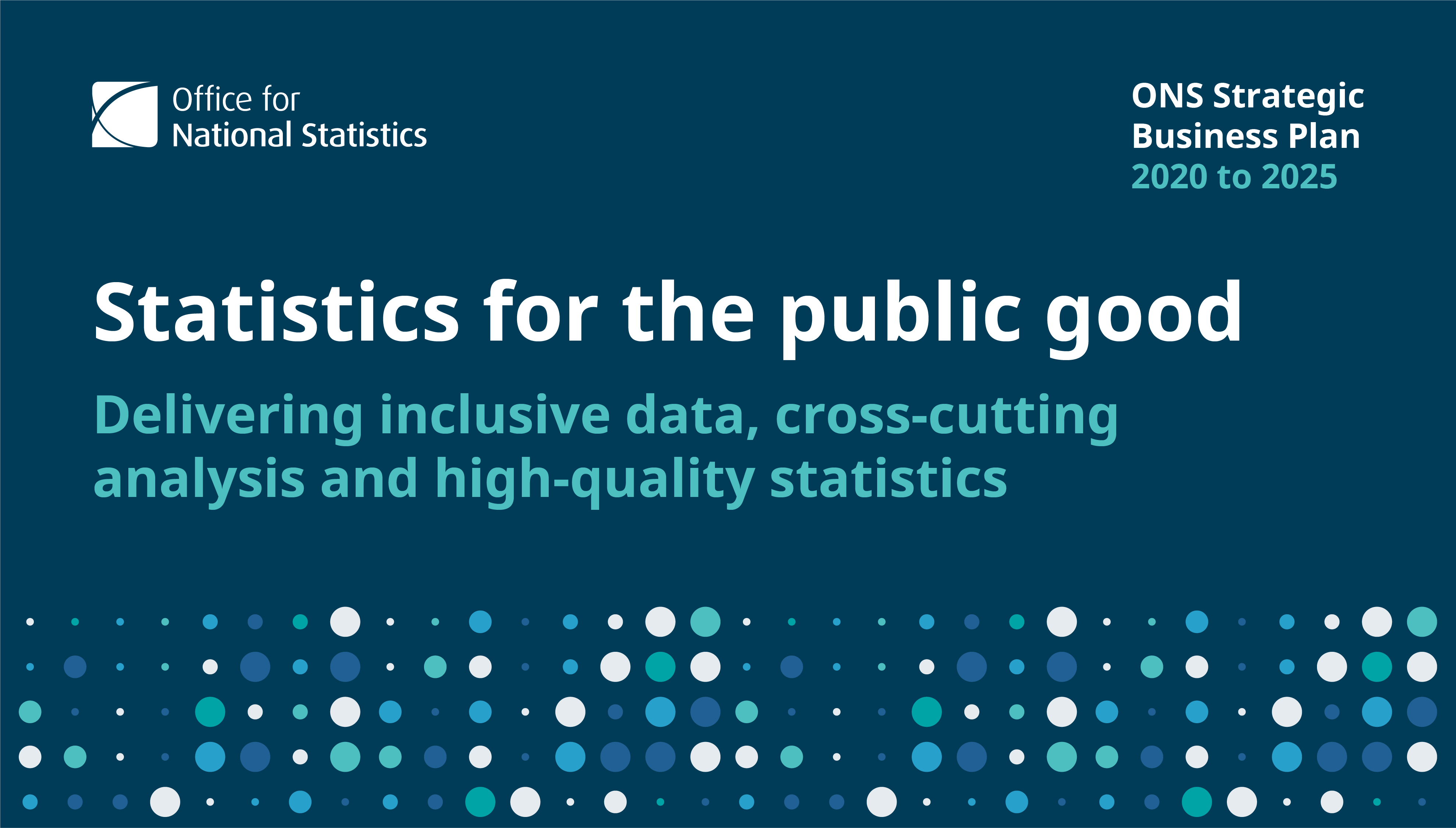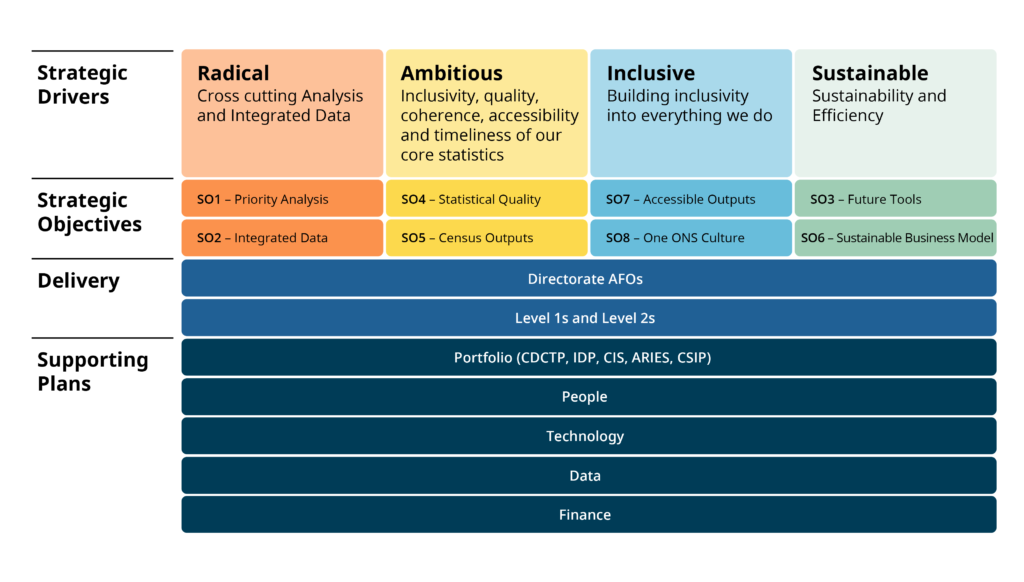How we align with the UKSA Strategy
UKSA Mission
The UKSA’s mission:
High quality data and analysis to inform the UK, improve lives and build for the future
Strategic Drivers
The core drivers that will support the ONS’s contribution to this mission over the five-year period of the UKSA Strategy are:
We will be radical in our drive for inclusive, cross-cutting analysis that enables Government, civil society and the public to understand the key questions of the day. To do so we will exploit radical approaches to data analysis, utilising leading-edge data science and methodological techniques, real-time data streams and AI to generate powerful insights to respond in an agile way to demand.
We will form inclusive partnerships across Government, academia and
civil society to ensure ongoing relevance to all our stakeholders, to harness the best expertise, and maintain our ability to pivot our response rapidly to new and emerging priorities, as demonstrated through the COVID-19 Infection Survey.
Through the Integrated Data Service Programme we will deliver the capability, processes and technology to support the integration of Government data and deliver and disseminate analysis that cuts across organisational and societal boundaries.
We will deliver relevant and timely reference statistics at pace with a relentless drive for quality and inclusion that reflects the population, society, economy and environment we live in today, including high-quality outputs from the Census 2021.
We will drive forward improvements to our outputs, data collection and data sharing across government (both legislative and policy), reducing friction and expediting access whilst ensuring our data principles are upheld. We will deliver ever more timely and granular economic and social statistics – flexing capacity across data science and analysis to meet government’s data needs.
We will deploy industry leading technology and tools to enhance our productivity and collaborative working, building a working environment that retains and attracts the best talent. We will transform how we present data to provide quick and easy access to all users through the web development programme.
We will ensure that the data we collect and outputs we produce reflect all sectors and groups of the economy and every member of society, acting on the recommendations from the Inclusive Data Task Force.
We will embed inclusivity in all our policies, practices, and outputs to ensure our statistics and analysis reflect the diversity of the economy and society in which we live and are fully accessible.
Our workforce and partnerships will be representative of the society we live in, supportive of the wellbeing of our workforce and inclusive by design in line with the principles of our People Plan.
We will deliver key data in support of the net zero agenda through our economic, social and environmental statistics.
We will pursue a continuous improvement approach through our efficiency framework to identify and deliver efficiencies that deliver more for less by simplifying, modernising and automating processes whilst reducing reliance on legacy systems and processes.
We will consider the sustainability of all our activities in relation to finance, people, technology, and environmental factors, and develop a business model that “builds back better”, integrating lessons from the COVID-19 pandemic. This will include aligning our resources to activities and programmes where we are uniquely placed to deliver, and that have the highest impact on our strategic priorities.
Through the activities described in this plan, the ONS will work with the statistical and analytical community to provide the evidence the UK needs to understand its evolving economic and social context and analyse key policy areas; and enhance the UK’s reputation for high quality, independent official statistics, which is critical for the credibility of the country.
Back to topStrategic Objectives
The following Strategic Objectives were developed as part of the ONS’s initial strategic business plan that was published in July 2020 to drive delivery over the five-year strategic period and have been further iterated to maintain relevance to current and expected future operational context, following the conclusion of the 2021 Spending Review.
The Strategic Objectives (SO) each align and contribute to all four Strategic Drivers, with the strongest association shown in the table below.
| Ref | SO Owner | SO Short Title | SO Detail | Priority deliverables | Main Strategic Contribution |
|---|---|---|---|---|---|
| 1 | Mike Keoghan | Priority Analysis | Working with new and existing partnerships to deliver inclusive, engaging and timely data, statistics and analysis on priority economic, social and environmental issues including on the impacts of the pandemic and the lives of those missing from our existing data sources. | Ambitious Radical Inclusive Economic Statistics (ARIES), Covid Infection Surve | Radical |
| 2 | Alison Pritchard | Integrated Data | In collaboration with the GSS, Government Analysis Function and wider government, deliver a ground-breaking, safe, secure and trusted integrated data service with associated data governance that drives the integration of Government data and the provision of cross-cutting analysis for the public good, and facilitates the evaluation of policy effectiveness. | Delivery of Integrated Data Services Programme (IDSP) | Radical |
| 3 | Alison Pritchard | Future Tools | To develop and future-proof the ONS’s statistical, analytical and data management tools, technologies and policies to meet the changing requirements of the business, at pace and with innovation to the fore. | IDSP Platform / Prioritised Legacy Replacement | Sustainable |
| 4 | Mike Keoghan | Statistical Quality | Drive improvements in the inclusiveness, quality, coherence, accessibility and timeliness of our priority statistics and outputs and set best practice for the development of UK statistical frameworks | Labour Market Transformation / Prices Transformation / Gross Domestic Product (GDP)/Crime/ Inclusive Data Task Force | Ambitious |
| 5 | Pete Benton | Census Outputs | To deliver outputs from the 2021 Census and a revised system of population and migration statistics, working towards a robust recommendation on the future of the Census in 2023 | Census Outputs / Transformation of population and migration statistics / to support 2023 Recommendation | Ambitious |
| 6 | Nick Bateson | Sustainable Business Model | To implement a sustainable and ambitious business model that enables ONS to deliver against the ambitions in the UKSA strategy using resources (people, funding & infrastructure) effectively and efficiently, while continuously improving ONS’s corporate services and systems so they are fit for the future | Efficiencies Framework | Sustainable |
| 7 | Owen Brace | Accessible Outputs | To deliver an efficient, targeted, accessible, inclusive and flexible publication and two-way engagement model that promotes understanding, provides information that our key stakeholders, users and the wider UK public need, and informs organisational delivery. | IDSP dissemination capacity | Inclusive |
| 8 | Philippa Bonay | One ONS Culture | To create an inclusive, collaborative, engaged and healthy working environment and a ‘One ONS’ culture where employees of different backgrounds, grades, characteristics and ways of thinking are consistently empowered and inspired to innovate, share learning and deliver their best work. | People Plan | Inclusive |
Accountability Framework Objectives
The 2022/23 Business Planning Round has delivered an updated set of directorate objectives – termed Accountability Framework Objectives (AFOs) – that underpin the annual delivery of the eight Strategic Objectives, support the delivery of the annual priorities as articulated in the National Statistician’s foreword and will contribute to the delivery of expected strategic outcomes and benefits.
The AFOs describe the key objectives from each ONS Directorate and are the result of collaborative, cross organisational development and planning.
How the plan fits together
Figure 2 below shows how the Strategic Drivers, the Strategic Objectives (and associated priority deliverables), the ONS AFOs and supporting plans (including the Portfolio Plan) align and fit together.
The priority deliverables contribute to the Strategic Objectives which in turn align to the Strategic Drivers set out in the UKSA Strategy. The Strategic Objectives are owned by a nominated member of the ONS Senior Leadership Team. They are reviewed each year and are used to drive the Annual Business Planning Round.
Each Directorate has a set of annual AFOs – supported by detailed Level 1 and 2 milestones – that deliver against the agreed priority areas and Strategic Objectives. The AFOs cover all ONS activity such as business as usual and programmes.
There are ‘profession’ and ‘functional’ plans that support delivery of the AFOs, Strategic Objectives and ultimately the Strategic Business Plan. Some of the key supporting plans are explained further in section 8 below.
Figure 2 – ONS Planning Hierarchy
Key:
CDCTP – Census and Data Collection Transformation Programme
ARIES – Ambitious Radical Inclusive Economic Statistics
IDSP – Integrated Data Services Programme
CIS – COVID-19 Infection Survey
CSIP – Corporate Systems Improvement Programme
Back to top

